Karen Salinger is co-owner and sales director of Veritable Vegetable, a San Francisco-based organic produce distribution company. Established in 1974, Veritable Vegetable is the oldest organic food distributor in the US, and it currently sells over two million pounds of organic produce a month.
“Women-owned and radically different,” Veritable Vegetable is unique in many ways—it diverts 99 percent of its waste, has a near-zero-emissions green fleet, and is both a Certified B Corp and a California Benefit Corporation. Karen has worked at Veritable Vegetable for a total of 32 years and became a co-owner in 1994. She joined OPN for a conversation about the company, her role as sales manager, organic produce trends, and more.
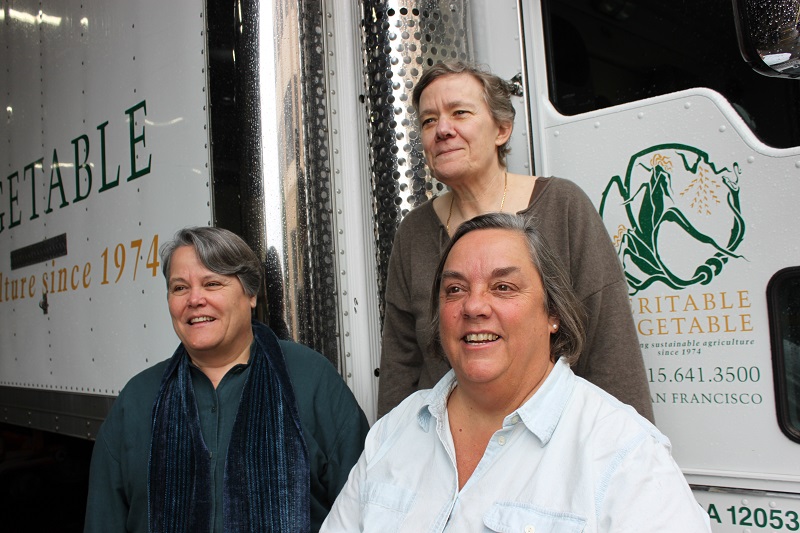
Veritable Vegetable co-founders (L to R) Mary Jane Evans, Karen Salinger, Bu Nygrens
Why does Veritable Vegetable sell only organic produce?
The idea of building a sustainable food system is an underlying value of our company. Organic agriculture and the methodologies used in organic growing practices are important factors in influencing the environment and our communities. We were founded to support organic farmers to bring healthy food to people, and we have done that successfully for 45 years.
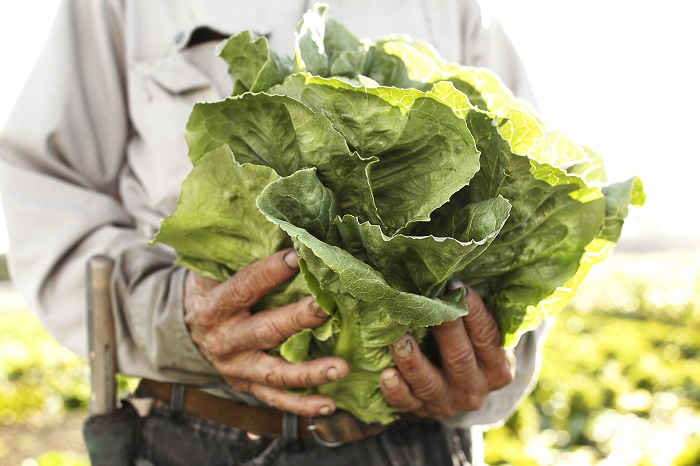
As someone who has been in the organic produce industry for a long time, can you share any trends you’ve noticed over the years?
There are so many changes that are going on kind of simultaneously. First of all, conventional food companies—or, as Michael Pollan now calls them, “Big Food”—have embraced organic, and it has really changed the landscape of how organic produce is bought and sold. There’s a lot of consolidation on the farmer side and also in distribution and retail. There used to be a lot more independent distributors like ourselves all over the country.
In retail we’re seeing a lot of volatility. As Big Food gets into organic, a lot of our independent retailers are being challenged as consumers have more stores to choose from. And price competition is increasing every day. We’re also seeing a lot of brick and mortar stores developing an online arm and a lot of online stores (like Amazon) acquiring brick and mortar stores. This is changing the landscape quickly and is also reflecting different buying patterns.
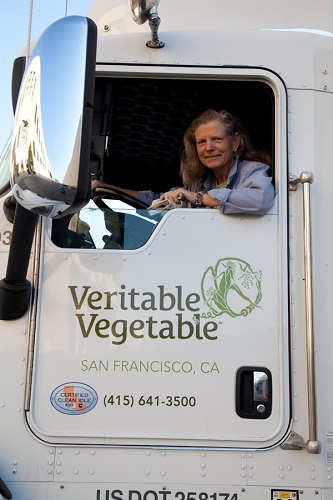
Have the changes you’ve just described affected your business in any way?
The volatility we’re seeing in the marketplace is reflected in our sales. We’re seeing some of our core retail customers get hit with a lot of competition, but we’re simultaneously seeing an ever-increasing demand for organic in many other sectors, such as manufacturing, restaurants, and food service. If you had asked me 10 years ago what percentage of our business sells into retail, I would’ve told you it was 85 percent. Now it’s 58 percent. Our business is much more distributed across other sectors, so that’s a huge change for us!
In terms of the food manufacturers you sell to, what kinds of products are they using your produce for?
So many different items—from organic juices to meal kits, smoothies to baked goods. Other food items that are popular are pickled and fermented foods, meat alternatives like meatless burgers, pre-cut vegetables, cauliflower rice, and prepared foods, too.
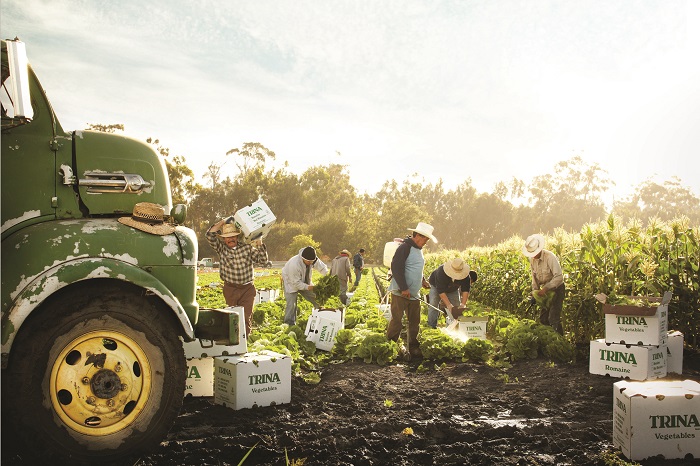
Have you noticed any changes in demand for particular produce items over the years?
There certainly are produce items that have really jumped in terms of popularity—the one thing that comes to my mind more than anything else is brussels sprouts. We used to have brussels sprouts during a very limited time of year around Thanksgiving, and now brussels sprouts are available all year round, and they sell like crazy all year round. Other trends which aren’t surprising are an uptick in demand for kale and various apple varieties. We’re also seeing broader trends around the demand for more tropicals, such as ginger, dragon fruit, galangal, and others, and culturally appropriate foods for the diverse communities we serve.
What are your sourcing methods for organic produce?
This really changes seasonally. We buy local as much as we possibly can and support mainly small- and mid-sized independent farms. But that said, distribution is a game of supply and demand. For example, this time of year (February), a lot of our product is coming from across the border because the California growing season for tomatoes, eggplant, zucchini, and cucumbers has ended. But in the heart of summer, it’s all coming from local growers. Our coolers here at Veritable Vegetable really reflect the seasonality of what’s available locally—we see product lines and growers changing all year round.
We’re about to start getting imported pears and apples from South America. That’s very traditional this time of year. The local supply runs out, and we support good organic farmers in the Southern Hemisphere. If we’re sourcing internationally, we’re trying to buy fair trade when we can. We only buy bananas, for example, from Organics Unlimited through their GROW (Giving Resources and Opportunities to Workers) program. Organics Unlimited is a really good company, and we’re proud to say we’ve been buying from them almost the entire time we’ve been in business.
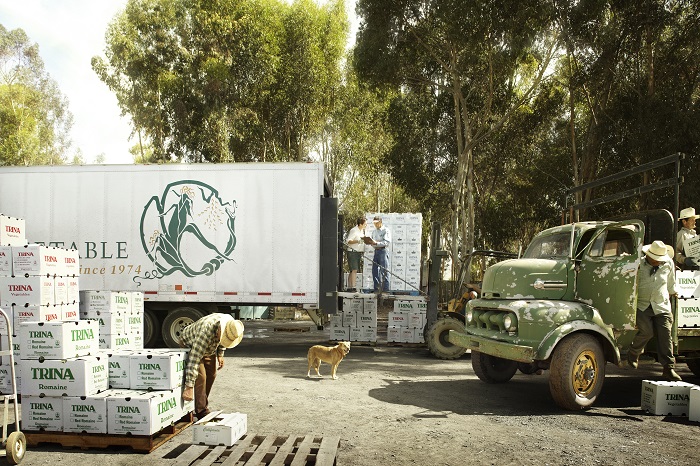
How important are your relationships with individual farmers, and how much time does Veritable Vegetable staff spend on-site on farms?
Relationships are at the core of what we do. We always say that the key to a good wholesaler/grower relationship is building trust through good communication and good planning. We support our growers by doing production planning, evaluating what grows best in their region, where there are gaps in the market, and forecasting expected demand. We share market information and keep our growers in the loop of regulatory changes.
We really like to understand what growers grow best. For example, if a particular grower does a really good job with heirloom tomatoes in July and August, we’ll forecast what we expect to sell. Then we build a campaign around promoting those tomatoes and that grower during that time of year. Having a very close relationship with our growers is critical.
We also invest in our relationships by encouraging our teams to visit our growers. Usually during the summer months, our buyers are out visiting farms. We also have a program available to all of our staff that gets them out of their day-to-day jobs and into the fields. It’s a way to get everyone in the company in touch with the broader food system.
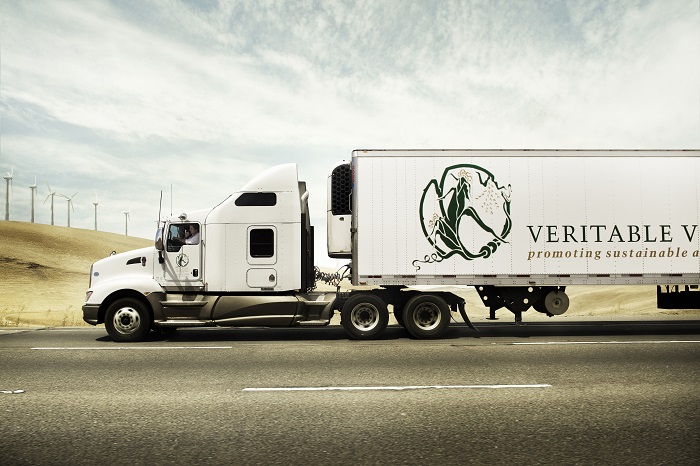
Do you have any concerns about the organic movement/industry?
I am very concerned about labor and climate change. We have farmers now that tell us, “Tomorrow we’re going to harvest Dino Kale. We don’t have enough crew to harvest both the Dino Kale and the strawberries, so we’ll do strawberries the next day.” We never used to hear stuff like that.
Climate change is impacting so much—even our expectations of what we’re going to see and when. In other words, we’re seeing early harvests, late harvests, and lots of natural disasters like floods and droughts. Prices are jumping around more than I’ve ever seen them jump around—very, very high extremes, not ever really super low extremes, but mostly high extremes.
Also, we have farmers who are retiring. They’re aging out, and they don’t necessarily have family members that are going to take over the farm. So we’re losing farmers. And there are barriers for new farmers to enter into the market, whether it’s because they can’t afford the land, or there is no land. I would really love it if we could reach consumers with this information somehow, so they could understand the true cost of food.
People always want to try to find something cheap. Food is not cheap; it’s expensive to produce, and its value is critical to the health of our bodies and our communities. If people are going to be paid a fair wage and the farmer’s going to make a living at it, the public needs to understand the true cost of food.






